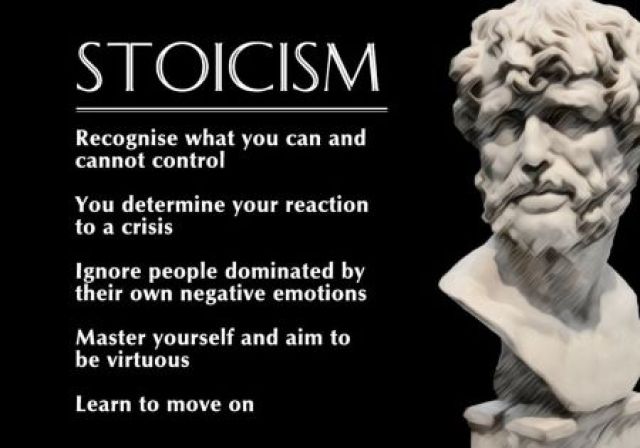The philosophy of Stoicism may be enjoying a renaissance.
This from wndnewscenter.org.

Stoicism—a school of philosophy founded in ancient Greece in the third century B.C. by Zeno of Citium with famous adherents such as Seneca, Epictetus, and Marcus Aurelius—is based on the principle of knowing what is within your control vs. what is outside your control.
Stoicism—a survival strategy, a way to overcome destructive emotions and protect one’s sanity in the face of often horrific difficulties—“means to be unemotional, like having one’s emotions botoxed.”
According to the Daily Stoic:
Stoicism is either unknown or misunderstood. To the average person, this vibrant, action-oriented, and paradigm-shifting way of living has become shorthand for ’emotionlessness.’
In addition to offering nine exercises to develop Stoicism—and although the philosophy is much more complicated than this simple example—the above-noted website explains:
[W]e cannot control or rely on external events,
only ourselves and our responses.
Marcus Aurelius, the Roman emperor from A.D. 161 to 180, spent the last 14 years of his life enduring a virulent plague that killed millions (and eventually killed him). Yet during this time he penned his famous “Meditations” on how Stoicism allowed him to cope.
Are there similarities between Stoicism and the Serenity Prayer? Yes, certainly.
Here is the Serenity Prayer in its entirety:
God grant me the serenity to accept the things I cannot change; courage to change the things I can; and wisdom to know the difference. Living one day at a time; enjoying one moment at a time; accepting hardships as the pathway to peace; taking, as He did, this sinful world as it is, not as I would have it; trusting that He will make all things right if I surrender to His Will; that I may be reasonably happy in this life and supremely happy with Him forever in the next. Amen.
The concept of…
It’s not how you feel, it’s how you behave…
…is a new and possibly difficult philosophy for many people to abide by.
Our modern society teaches that emotions and feeeeelings are paramount. Every little perceived micro-aggression must be treated as earth-shattering and personal. The government is literally enshrining emotions (hurt feeeeeelings) into law.
Interestingly, Stoicism apparently is the basis of modern cognitive behavioral therapy (CBT), the leading evidence-based form of psychotherapy. It teaches patients not to dwell on the past, but to focus on making healthier decisions in the present, thereby creating a better future.
In this article, we see:
Stoics reflect on character strengths such as wisdom, patience and self-discipline, which potentially make them more resilient in the face of adversity. They try to exemplify these virtues and bring them to bear on the challenges they face in daily life, during a crisis like the pandemic. They learn from how other people cope.
Since Stoicism has survived the test of time, clearly there’s something to it. Take the issue of anger management. According to this article:
Seneca thought that anger is a temporary madness, and that even when justified, we should never act on the basis of it because, though ‘other vices affect our judgment, anger affects our sanity: others come in mild attacks and grow unnoticed, but men’s minds plunge abruptly into anger. … Its intensity is in no way regulated by its origin: for it rises to the greatest heights from the most trivial beginnings.’
Or, as Marcus Aurelius put it:
Choose not to be harmed and you won’t feel harmed. Don’t feel harmed and you haven’t been.
Another modern enthusiast named Kevin Koenig observes that Stoicism:
[T]eaches to soberly decide what is the best course of action in a given moment, exercise that action to its fullest, and trust that the sum of these minute decisions, made again and again and again and again, will result in the best life one can hope to lead.
The rekindled interest in Stoicism is no accident. The original philosophy developed during a time of enormous and fracturing changes in the ancient Greek world. We are facing similar issues in our modern times.
We cannot change anything around us. We can only change how we react. Those are words to live by.
And last but not least, the recent words calmly stated by an individual who one day may be considered to be a very wise man in his own right, Elon Musk:
Go F*ck Yourself.
Final thoughts: What pulled me into this article is the reference to the Serenity Prayer. Like many, I am disgusted with what the Left is doing to our beloved country, I am dumbfounded by the success of the Obama fundamental transformation of America, and I am of little or no use to speeding up President Trump and his Plan for the Take Back of our Constitutional Republic.
This reminder of Stoicism and the Serenity Prayer has lowered my heart rate a bit and has helped me to perhaps more effectively address my character defect of a lack of patience.
For the time being—short of becoming a Lone Wolf—I must Let Go and Let God.




